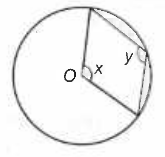 Multiple Choice Questions
Multiple Choice QuestionsA square and a circle are formed using pieces of wire oflength 5024 cm each. The ratio of the area of the square to that of the circle is
D.
Consider the following statement "If the diagonals of a quadrilateral bisect each other, then the quadrilateral is a parallelogram." This statement is a/an
axiom
proposition
definition
theorem
In NCERT exemplar book for Class VIII at the end of Unit 5, Understanding quadrilaterals and practical geometry', lots of activities like constructing tessellation, constructing tangrams, etc., are given. One of the objectives of such tasks is to help
kinesthetic learners only to improve their visual thinking skills
auditory learners only to improve their creative skills
all learners with different learning styles and to enhance spatial orientation
visual learners only to improve their analytical skills
If AB x BA = BCB, where A, B and C stand for just one digit and , then the value of A + B + C
9
8
6
10
If x, y and z represent the number of faces, number of vertices and number of edges respectively of a polyhedra, then which of the following is true?
x + 2 = z - y
z - 2 = x - y
y - 2 = z + x
x - 2 = z - y
If O is the centre of a circle in given figure, then relation between x and y is

x - 2y = 0
y - 2x = 0
x + 2y = 1800
x + 2y = 3600
